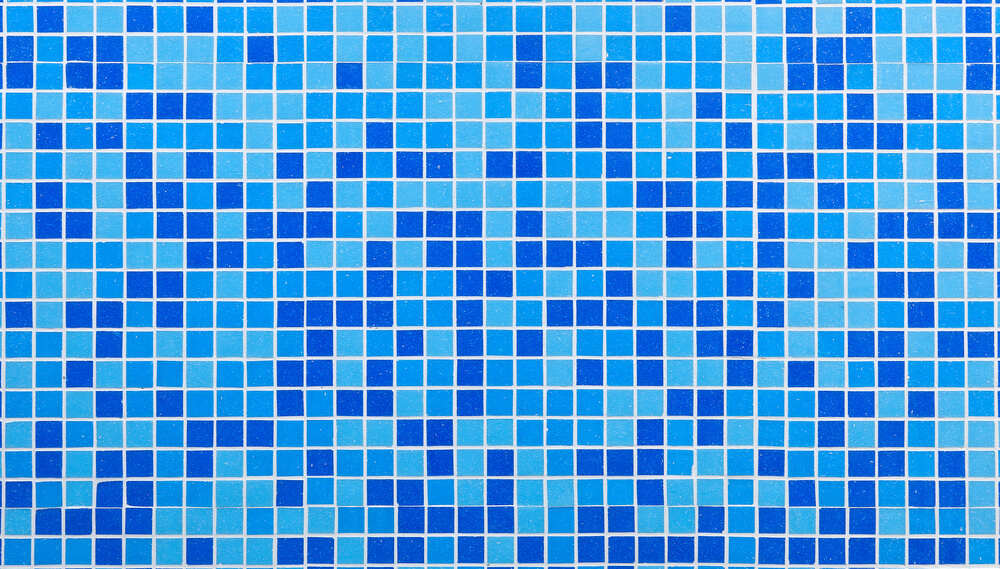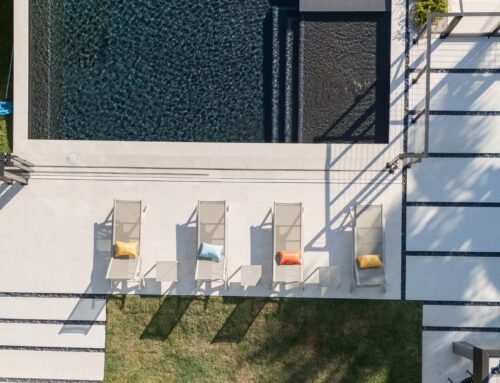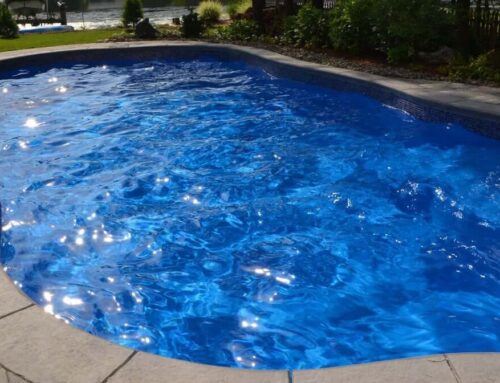Tiles are the Cadillac of pool finishes. While there are many good reasons to look into other options, you simply can’t go wrong with tiles.
They’re durable, attractive, and easy to clean. But not all tiles are created equal.
If you’ve chosen to use tile, you’ve won half the battle. Now, we’re going to help you win the other half. In this article, you’ll learn about the different kinds of swimming pool tile and how to pick the right one for your pool.
Let’s dive right into the deep end!
Types of Tiles for Swimming Pool
Before getting into the nitty-gritty of what you should consider when picking tile, it’s worth going over your choices. Each has benefits and drawbacks that can make a huge difference, so it’s worth learning what those are.
Ceramic Pool Tile
Ceramic tiles are by far the most popular for pools. And they’re available in two varieties — glazed and unglazed.
As the name implies, glazed tiles have a hard coating that makes them shiny and a little more resistant. The reflective glaze prevents the tiles from absorbing as much heat as they otherwise would, and many people like the appearance of a glimmering pool surface.
Unglazed tiles aren’t much different, but they will absorb a little more heat and obviously be slightly less reflective. Regardless of the type of ceramic tiles you choose, they can be hand-painted and can make fantastic mosaics if you’re willing to invest a little extra.
Porcelain tiles are a subtype of ceramic. The process used to make porcelain results in a hardier, denser, and more durable tile. They tend to be fractionally more expensive, but they’re often worth the extra money.
Stone Pool Tile
Stone tile is your go-to choice when you want to accentuate a pool’s natural appearance. They’re ideal for custom pool shapes that try to fit into the scenery, but they work great for geometric pool shapes as well.
With stone, you’ve got many choices, including travertine, flagstone, sandstone, etc. But knowing the names of the stones won’t do you much good. When you’re having your pool installed, or before you start, ask your pool installer to show you some samples. The only way to really get a sense of how the stone will look and feel in your backyard is to touch it and see it.
Stone is, as you might imagine, durable and long-lasting. However, the stone is a porous material. So you’ll probably have to get your tiles sealed every few years to prevent water damage to your pool shell.
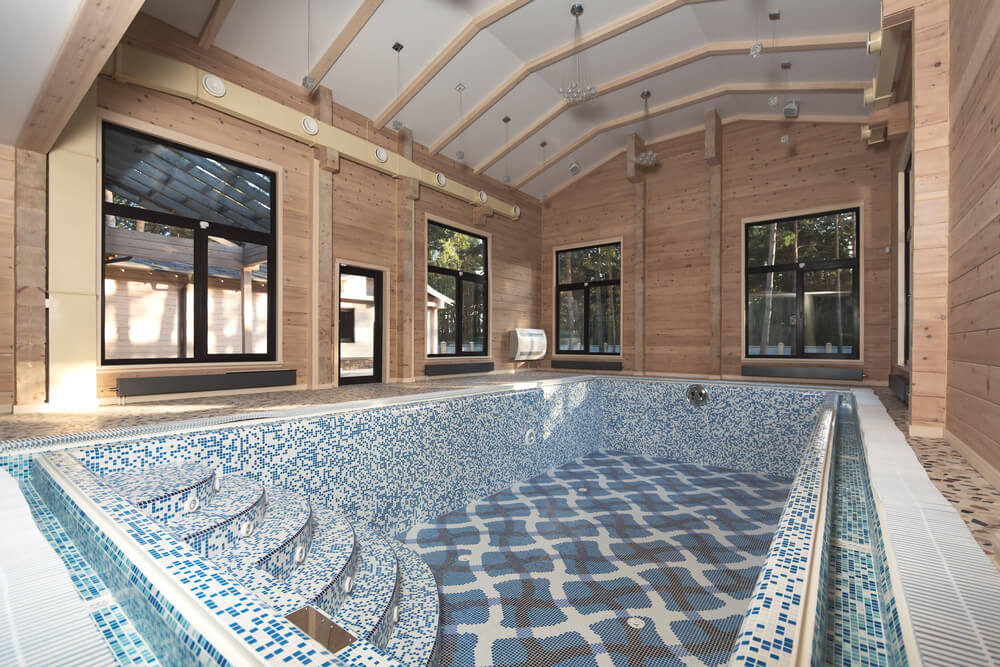
Brick Pool Tile
Brick isn’t as popular as it once was for pools, but that will just help your pool stand out from the others. The decline in brick’s popularity has nothing to do with how good it looks; brick is a beautiful tile choice.
However, bricks are highly porous, so they need to be sealed every few years. If you choose brick, know that you’re making a bigger investment in the long run.
Quartz Pool Tile
With quartz tile, you’re approaching the higher end of the price spectrum. Quartz tiles aren’t solid quartz but rather a mixture of crushed quartz, white cement, and pigments.
Usually, quartz is an ideal choice if you want to make an impression. The crushed quartz refracts light in all sorts of interesting patterns and will give your pool surface a shimmering appearance.
If you have lights installed in your pool, quartz will be the best at accentuating the interplay of water and light in the evenings.
Glass Pool Tile
With glass tiles, we’ve arrived at the top of the mountain. Glass is the crème de la crème, and it has the price tag to prove it.
Despite the high price, you may want to give glass tiles a chance because you’re not likely to find a better way to ensure a long-lived pool. It’s resistant to chemicals, UV lights, it’s non-porous, and it looks fantastic. And, unless a glass tile is chipped or broken off, you will never have to replace it.
Maybe the singular drawback glass has, besides its price, is how brittle it is. Glass tiles are, after all, made of glass. So you’ll want to avoid dropping objects in your pool or any sharp blows to the pool surface that might chip it and create a hazard.
Things To Consider When Choosing Tile for Swimming Pool
We have access to one of the most diverse selections of pool tile Miami has to offer. But to make use of that selection, you need to know how each of these tiles fits different needs.
Now that you understand your choices, let’s go over the factors that should go into your decision.
- The size of the tile
If you have a geometric pool (flat sides and bottom), the tile size you choose won’t make much of a difference. In fact, you could end up saving money by selecting a larger tile. But if you have a rounded pool, you’ll need to look at how the tiles will conform to the shape and how small they need to be for that. And, always keep in mind that a larger tile is easier to fracture.
- The color of the tile
Generally, you’ll want to pick a tile color that aligns with the rest of your backyard’s color scheme. But sometimes, using the pool tile to create an exciting contrast is also a good idea. Your best bet is to consult a pool installation professional for advice about the best color for your pool.
- How much maintenance can you commit to
Every type of tile has different maintenance requirements. And while tile is generally easy to maintain, that doesn’t mean you can neglect it altogether. Make sure you discuss maintenance options with your pool installer. Generally, the more you invest upfront on quality tiles, the less you’ll need to invest over the long term in maintaining them.
- Pick a good warranty
Installing tiles, especially higher-end tiles, can be a substantial expense. Protecting your investment makes good financial sense, so if you have the choice, pick a tile supplier or pool installer that offers extended warranties. Even if you end up selling the house before the warranty period, you can transfer the warranty to the next owner to create added value for your home.
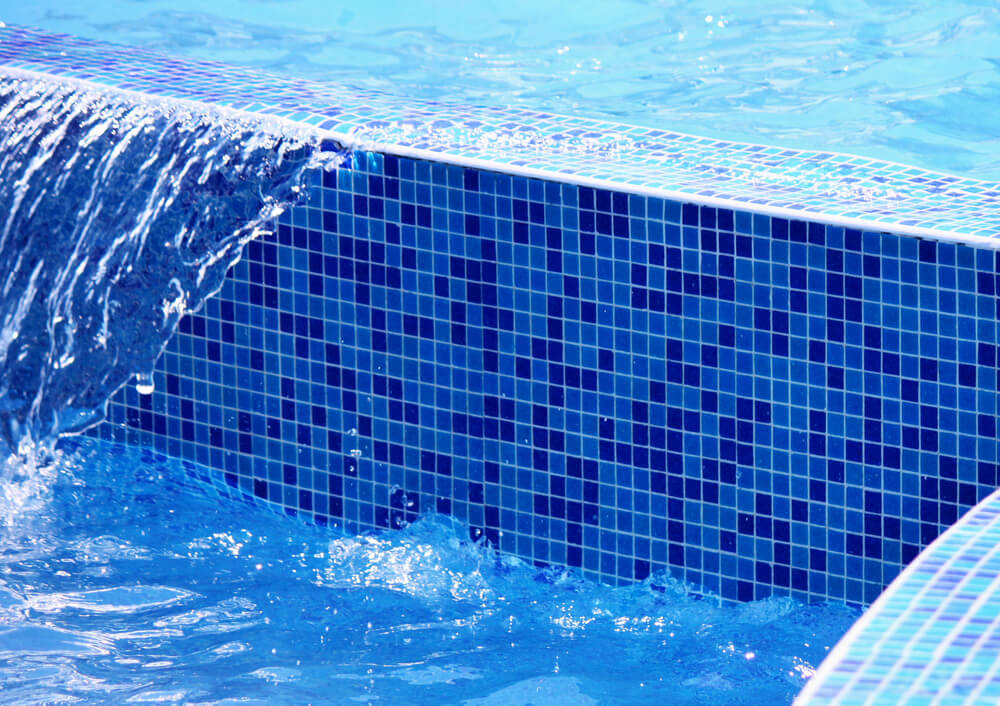
The Right Tile at The Right Price
As you can see, there’s more to picking out pool tiles than just going for the cheapest one. There are many factors to consider and weigh against each other. Try to keep three main things in mind:
- start with a budget in mind;
- try to stay away from high-maintenance tiles; and
- it’s always better to have a warranty than not to.
If you’re ready to resurface or install a pool, we’re ready to help! And while we love installing pools, we also love hearing from you. Leave a comment or send us an email if you have any doubts about what tile would be best for your pool.
Call us today, and one of our pool installation specialists will give you a free estimate.

